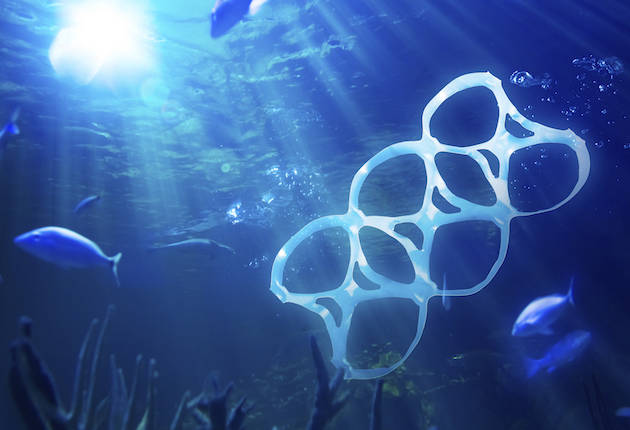A new study by the World Economic Forum examines the so-called “New Plastics Economy,” but its the old plastic that is drawing attention to the report. The research suggests there will be more plastic in the world’s oceans than fish by the year 2050.
The report gave several figures to support its findings. At least eight million tons of plastic ends up in the oceans annually, the equivalency of a dump truck’s worth every minute. The researchers expect that number to jump to two trucks a minute — 16 million tons a year — by 2030. By 2050, the number could be four trucks a minute.
“The best research currently available estimates that there are over 150 million tonnes of plastic waste in the ocean today,” the report reads. “Without significant action, there may be more plastic than fish in the ocean, by weight, by 2050.
“Even by 2025, the ratio of plastic to fish in the ocean is expected to be one to three, as plastic stocks in the ocean are forecast to grow to 250 million tonnes in 2025.”
Plastic packaging makes up the largest percentage of the trash. According to the report, it accounts for 26 percent of the products manufactured from plastic but equals 62 percent of all the products (plastic and non-plastic) picked up in international coast-cleaning operations. This is a result of 95 percent of packaging being discarded after the first use — a loss to the economy of $80-120 billion annually.
Recycling efforts don’t seem to be effective in combatting this. Forty years after the first universal recycling symbol was introduced, only 14 percent of plastic packaging is collected for recycling.
Pointing to another report, Stemming the Tide, the WEF said reductions today would only stabilize the amount of plastic in the oceans, not lower it. This is due to the rate at which plastics are increasing in the
Plastics represent six percent of the global oil consumption, the same as the global aviation sector. Plastics are expected to represent 20 percent of oil consumption by 2050.
“The New Plastics Economy: Rethinking the future of plastics” was created by interviewing 180 experts and analyzing more than 200 reports.
According to Costa, humans produce more than 220 million tons of plastic each year — much of which ends up in the oceans. Plastic debris in the ocean reportedly claims more than one million seabirds and more than 100,000 marine mammals each year, in addition to a multitude of other problems plastic pollution causes in the environment.
Doing Their Part
Costa is aiming to make a difference through its Kick Plastic campaign, which launched last year. The company highlighted the effort at the 2015 ICAST event in Orlando; visitors were greeted to the convention by a nine-foot marlin made from plastic found on shorelines.
As the campaign continues to build momentum, Costa recently introduced its new line of “See What’s Out There” t-shirts, made from 50 percent polyester — comprised of recycled plastic — and 50 percent organic cotton.
The six new shirts come in vibrant color options, such as red heather, royal blue heather, and charcoal heather, featuring original hand-drawn artwork of places Costa loves and wants to protect, such as the Casa Vieja lodge in Guatemala, where the billfish productivity is unbeatable.
Other locations featured include Ascension Bay, one of the best inshore fishing destinations in the world, as well as the Northern Baja region in Mexico, the U.S. Virgin Islands, and Key West, Fla.
“Plastic pollution is a very real threat to the oceans as we now know it — more than 80 percent of the world’s fish test positive for plastic in their system, and more than 20 billion plastic bottles end up in the ocean each year,” said Al Perkinson, vice president of marketing for Costa. “Working together to make small changes, such as swapping out plastic grocery bags for reusable ones, or drinking out of a permanent water bottle, can go a long way to reducing the amount of plastic trash from ending up in the oceans.”
The “See What’s Out There” line of t-shirts retail for $34, and are available online at costadelmar.com and at authorized Costa retail partners.
To learn more about the Kick Plastic movement, visit costadelmar.com/kickplastic.
Cover Image: Thinkstock

